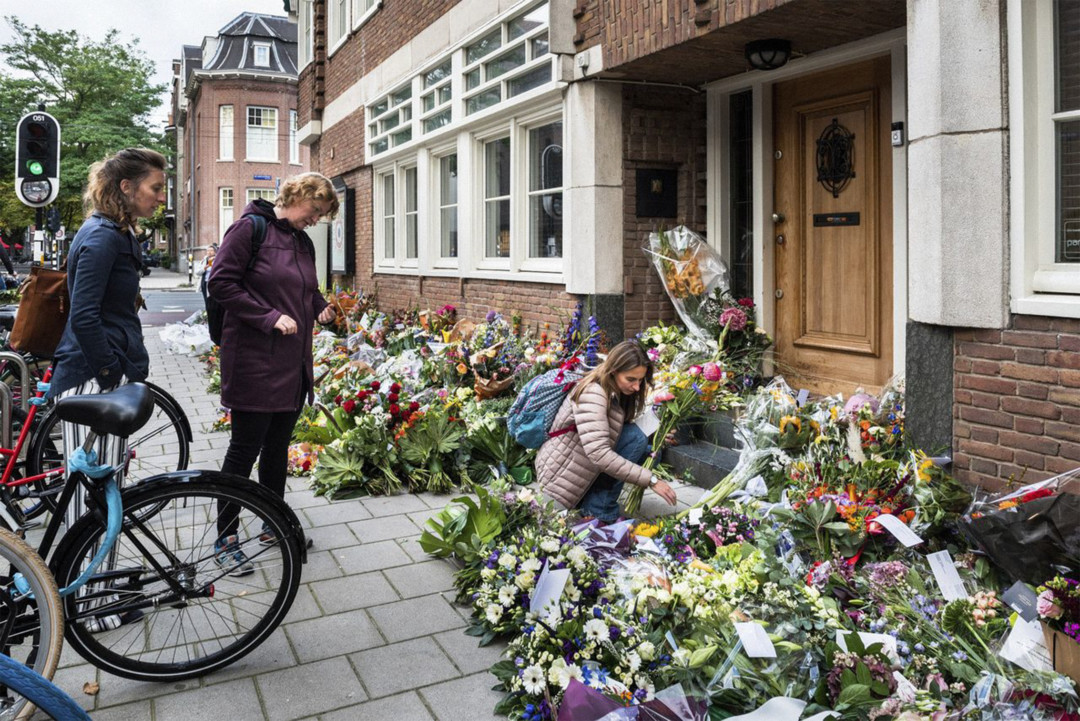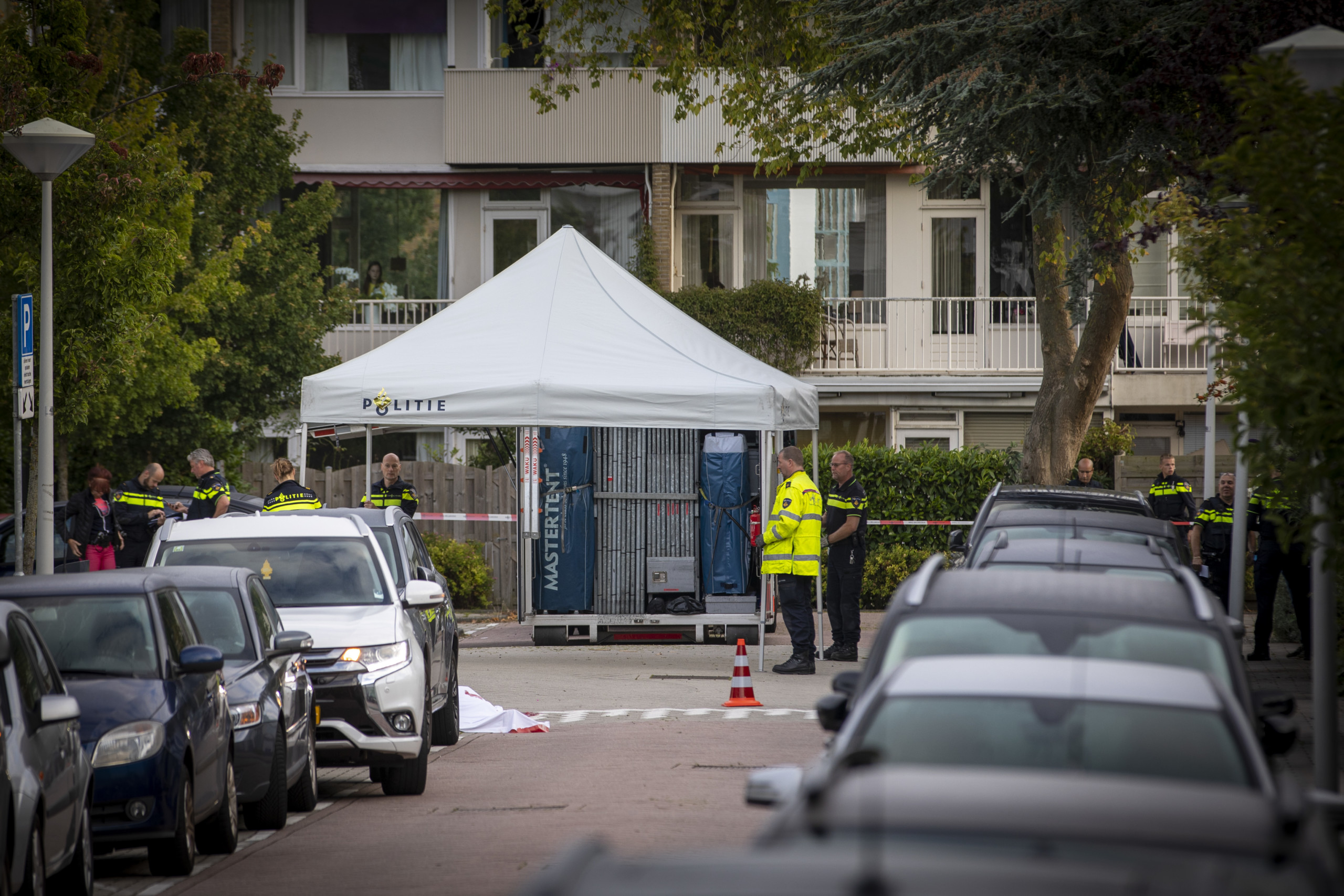18 September 2019
Amsterdam, Netherlands
Derk Wiersum
Profession
Criminal Justice
Motive
Governance targeting


Adolfo Olivas


Ahmed Divela


Amit Jethwa


Artan Cuku


Babita Deokaran


Bayo Ohu


Berta Cáceres


Bhupendra Veera


Bill Kayong


Boris Nemtsov


Boško Buha


Chai Boonthonglek


Charl Kinnear


Chut Wutty


Chynybek Aliev


Cihan Hayirsevener


Daphne Caruana Galizia


Darío Fernández


Derk Wiersum


Deyda Hydara


Édgar Quintero


Edmore Ndou


Edwin Dagua


Federico Del Prete


Fernando Villavicencio


Gezahegn Gebremeskel


Gilles Cistac


Habibur Mondal


Igor Alexandrov


Jacob Juma


Ján Kuciak


Javier Valdez


Joannah Stutchbury


José Ángel Flores


Jules Koum Koum


Kem Ley


Luis Marroquín


Mahamudo Amurane


Marcelo Rivera


María Elena Ferral Hernández


Marielle Franco


Milan Pantić


Milan Vukelić


Muhammad Khan


Nelson García


Nihal Perera


Oliver Ivanović


Orel Sambrano


Perween Rahman


Peter R. de Vries


Rajendra Singh


Salim Kancil


Sandeep Sharma


Sikhosiphi Radebe


Slaviša Krunić


Soe Moe Tun


Victor Mabunda


Virgil Săhleanu


Wayne Lotter


Yuniol Ramírez


Zezico Guajajara
18 September 2019
Amsterdam, Netherlands
Profession
Criminal Justice
Motive
Governance targeting
Early one Wednesday morning in the residential area of Buitenveldert, Amsterdam, as he had crossed the road to get into his car, lawyer Derk Wiersum was gunned down. A young man was seen fleeing the scene. Half an hour after the police arrived, they confirmed that Wiersum had died of his injuries. His wife, a judge, and one of his children were at home as Wiersum, splayed out on the street outside, was covered with a sheet while the police started their investigation.
A criminal-law practitioner, Wiersum was the lawyer acting for a state witness in a case against members of a drug gang operating in the Netherlands. Police chief Erik Akerboom said: ‘With this brutal murder, a new limit has been crossed: now even people simply doing their work no longer seem safe.’
Well known in the Dutch criminal-law circuit as a kind, intelligent, erudite and honourable lawyer, 44-year-old Wiersum had built his career around fighting for the underdog. ‘Whether the system is just or unjust: in both cases a lawyer is absolutely necessary,’ Wiersum said in one of his very few publicized interviews.
Wiersum had been representing a gang member who had turned state witness for the prosecution, Nabil Bakkali, whose brother was shot dead in 2018. Bakkali was a key witness in the case against a group of men accused of five murders between 2015 and 2017, dubbed the Marengo trial.
Two of the accused in those killings, Moroccan nationals Ridouan Taghi and Said Razzouki, are believed to be part of a drug ring that controls about a third of Europe’s cocaine trade. The EU police agency EUROPOL lists them among Europe’s most wanted fugitives.
In March 2018, Bakkali’s brother was assassinated as retribution for his cooperation with the state. If it is proven that Wiersum was assassinated because of his involvement in the case against some of the biggest names in the underground drug economy, it would be a first in the Netherlands.
The country erupted when news of the assassination broke. Members of government, the judicial branch and citizens were quick to condemn the murder as an attack on the rule of law. Courts, law firms, ministries and the Council for the Judiciary flew their flags at half-mast in Wiersum’s honour, and the Dutch Bar Association observed a minute’s silence. Wreaths of flowers were piled outside of Wiersum’s home and law firm in Amsterdam.
During a memorial service organized by the Amsterdam Bar Association, Bart Stapert, Wiersum’s closest colleague and mentor, said that even his murderer deserved legal representation. ‘It would be the best way to remember Derk, because that is the type of rule of law that he stood for.’
The public display of national mourning prompted a discussion about lawyers’ safety and the future of the system of key witnesses. While the police said they would intensify protection measures around such cases, another lawyer in the Marengo case, Natacha Harlequin, questioned in a late-night talk show ‘at what cost’ the Netherlands would continue working with key witnesses.
Offering a reduced sentence to a suspect willing to give information on criminal operations, like Bakkali in the Marengo case, ‘comes with a great deal of uncontrollable and unforeseeable risks’, said another lawyer in the same broadcast. These risks are present partly because of the transparency of the Dutch court system, in which hearings and verdicts are open to the public and the media.

Well-wishers gather outside Wiersum's home, near where he was gunned down

The crime scene
A professor in criminal law at the University of Amsterdam said that Wiersum’s murder is likely to make lawyers even more apprehensive of the key witness system: ‘They know now that even in the Netherlands it could cost you your life.’
Since the assassination of Bakkali’s brother, an attack targeting Wiersum had not been unthinkable. But, according to a friend and colleague of Wiersum, lawyer Jillis Roelse, he felt he should ‘just be able to do his job. Derk would cycle to work: “We live in the Netherlands, don’t we?” is what he would say.’
Wiersum was a distinguished member of the Dutch legal community. Besides running his own firm, he was on the board of the Foundation for Legal Aid for Death Row Convicts, worked as lawyer at Dutch&Detained, an organization offering help to Dutch detainees abroad, and taught criminal law. He specialized in matters of extradition and organized crime.
After Wiersum’s death, crime reporter and author Jan Meeus said that the Netherlands is ‘naive’ when it comes to organized crime and the influence of the cocaine trade in the country. In an interview, Meeus said that the Netherlands could well be considered one of the major cocaine hubs in western Europe, as most of the cocaine arriving in Rotterdam and Antwerp is trafficked by drug rings working from the Netherlands. The country has been described as a narco-state.
According to Meeus, the sheer amount of money in the drugs economy should inform discussions on legalization of drugs to avoid illegal trafficking, and he questions whether it is right that tracking down organized-crime cartels, such as the one in the Marengo case, should be to the detriment of the rule of law and the safety of lawyers.
Following Wiersum’s death, the Dutch Bar Association has set up a point of contact for lawyers and judges who fear for their safety. A special team from the National Coordinator for Security and Counterterrorism is in charge of coordinating the safety measures for all those involved in the case.
Just a week after Wiersum’s death, the case against Taghi and his criminal organization picked up again where it had left off. But this assassination had left its mark on the country.
February 2023 update
On 11 October 2021, two suspects, Moreno Bieseswar and Giërmo Brown, were sentenced to 30 years in prison for planning and carrying out Wiersum’s murder. The sentence was followed by an appeal from the public prosecution service demanding life in prison for the accused. Two years later, the Amsterdam Court of Appeal upheld the sentences against the two convicted suspects. In a ruling issued in February 2023, the court recognized that Wiersum was not the only person connected to Bakkali who was assassinated, but it did not find enough evidence to prove that Wiersum’s murder was connected to the Marengo trial and, by extension, to Ridouan Taghi and Said Razzouki.
March 2024 update
In March 2024, an Amsterdam court sentenced a relative of Ridouan Taghi (who had been sentenced to life imprisonment in the Marengo trial a month earlier) to 26 years in prison for complicity in the murder of Wiersum. Anouar T, who had been arrested in 2020, was found guilty of leading a criminal organization that facilitated Wiersum’s murder by providing the car that followed Wiersum and the hitmen who carried out the murder. Eight other suspects were sentenced to between 208 days and seven years in prison for their involvement in the murder.


8 April 2017
Tirana, Albania
Artan Cuku


27 February 2015
Moscow, Russia
Boris Nemtsov


10 June 2002
Belgrade, Serbia
Boško Buha


19 December 2009
Bandirma, Turkey
Cihan Hayirsevener


16 October 2017
Bidnija, Malta
Daphne Caruana Galizia


18 February 2002
Casal di Principe, Italy
Federico Del Prete


1 July 2001
Slavyansk, Ukraine
Igor Alexandrov


21 February 2018
Veľká Mača, Slovakia
Ján Kuciak


11 June 2001
Jagodina, Serbia
Milan Pantić


6 November 2007
Banja Luka, Bosnia and Herzegovina
Milan Vukelić


16 January 2018
North Mitrovica, Kosovo
Oliver Ivanović


15 July 2021
Amsterdam, The Netherlands
Peter R. de Vries


22 April 2019
Banja Luka, Bosnia and Herzegovina
Slaviša Krunić


7 September 2000
Iași, Romania
Virgil Săhleanu